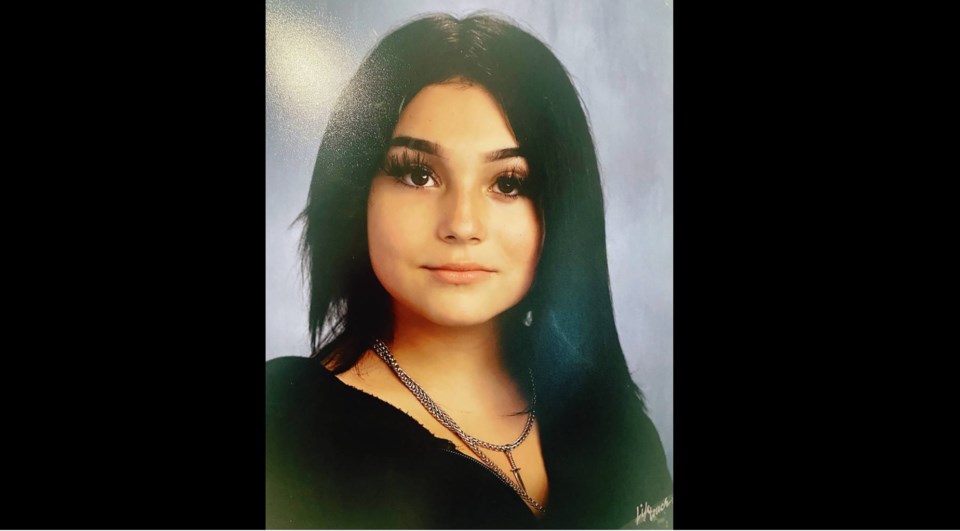The overdose death of a 12-year-old Greater Victoria student is an example for children and parents of how lethal illicit street drugs are and the reach of the overdose crisis, says the girl’s mother.
Allayah Yoli Thomas, a Grade 6 student at Gordon Head Middle School, died April 15, two months after she turned 12.
The BC Coroners Service says it is investigating the death to determine what happened, including cause of death.
Mother Adriana Londono said on the day she died, Allayah and her 15-year-old friend went to downtown Victoria “to buy downs, heroin, which is fentanyl these days, and then did it and went home.”
They returned to the friend’s home in Langford, where the friend’s father thought Allayah seemed groggy. Allayah said she had consumed alcohol, was tired and went to bed. “She did not wake up.”
Had she told him they had consumed drugs, he likely could have saved her, said Londono. “But kids are scared to tell their parents they’ve done drugs.”
Since November, Allayah had ended up at Victoria General Hospital three times for overdoses, her mother said, once staying for a week for psychiatric help. “I think she was crying for help.”
Allayah grew up too fast, said her mother. Influenced in part by social media, she began wearing makeup and dressing older and became interested in boys, said Londono. She started smoking cigarettes and marijuana, then it was a quick transition to hard drugs, including meth and heroin at 11. She also began cutting herself like her mother had when she was the same age and her father left, Londono said.
Londono had left the home of her mother and stepfather — where she lived with Allayah and her other children, age 11, and two — in November at the request of the Ministry of Children and Family Development, after Londono attempted suicide because of a break-up and ended up in hospital.
“We were all living together in a big home and we were all happy,” said Londono, who said she has mental-health and substance-use challenges and has herself overdosed nine times due to the tainted drug supply. “That’s how lethal it is.”
Londono believes her daughter needed long-term residential treatment but says that wasn’t available because of her age. “They said there’s no rehab until she’s 14, no treatment facilities until she’s 14, so now she’s dead and she’s 12 and that’s not fair.”
Giving her daughter phone numbers for outreach workers and counsellors was ineffective, said Londono. “Allie didn’t want to go talk to someone once a week,” she said. “She needed at the time to be in a long-term rehab facility. That’s what she needed. They wouldn’t give it to me. They wouldn’t help. My daughter died because she didn’t get the help she needed.”
Provincial Health Officer Dr. Bonnie Henry on Wednesday called the death a tragedy and said while experimentation is part of young people’s lives, it’s a dangerous time for it. She appealed to parents to talk to their children, and to children to speak with their families and friends.
Anyone who is experimenting with drugs should never do it alone, and should have access to Naloxone, which counters the effects of an opioid overdose, she said. “We know how toxic the street-drug supply is and you cannot trust that whatever it is you are buying off the streets is safe.”
Londono said she wants to tell youth: “Don’t be afraid to tell your parents” or find someone responsible to talk to.
“They don’t want to die at 12 years old like Allie did,” said Londono. “These drugs are killing so many people. They need to know that they can trust in their parents to understand what they’re doing and to help them.”
Every child and parent should be educated about how lethal street drugs are, said Londono. “They go downtown and they buy drugs and they think they’re going to have fun, but they can die instantly. They don’t know how quickly this can happen to them.”
Harold W. Caldwell, associate superintendent of the Greater Victoria School District, said it’s rare to have a 12-year-old die from a drug overdose.
The school sent out an advisory to families in the district the day of Allayah’s death, advising them about toxic drugs circulating in the community that are having an impact on youth at the middle and secondary levels.
“We know children will experiment,” said Caldwell.
“We don’t want to create fear, because the fear in itself will cause harm. So we really want to build around harm reduction. How do we delay — and that’s the intent around middle school — how do we delay them from experimenting?”
Caldwell said research shows early interventions have an impact, as do open dialogue with adults and a focus on the factors that contribute to substance abuse.
It’s almost inconceivable to think of a child dying from an overdose, he said. “We just can’t even imagine what the family is going through and struggling through,” he said. “Our condolences are with that family and all families that are working through, not only death due to COVID, but deaths related to substance use and mental health.”



